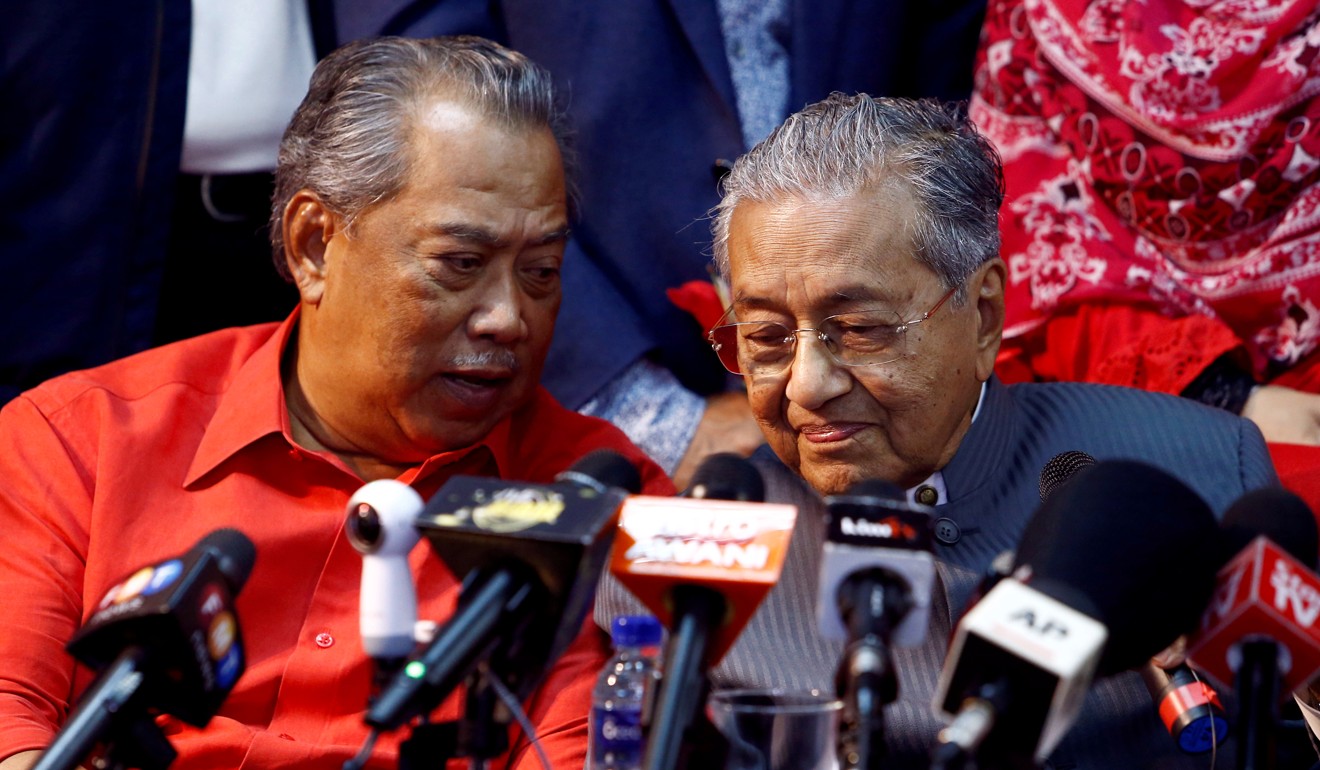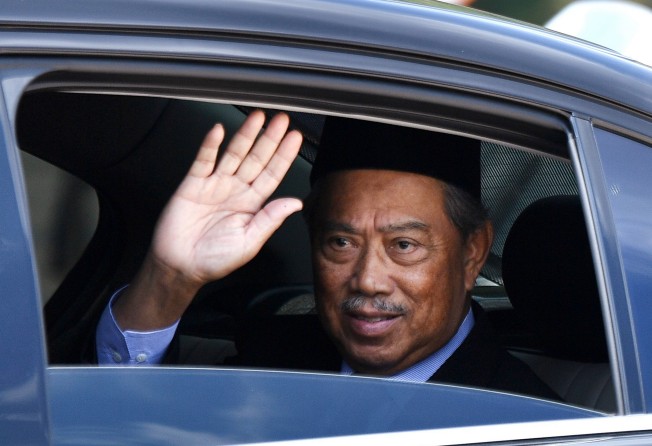
Malaysia’s new cabinet sees return of Umno, with a banker as finance minister
- Prime Minister Muhyiddin Yassin has announced the cabinet line-up a week after he took office amid political chaos
- CIMB Group Holdings chief executive Zafrul Aziz has been named finance minister

Malaysia’s Prime Minister Muhyiddin Yassin on Monday unveiled his new cabinet a week after taking office, naming a banker as finance minister and bringing back an array of politicians from his former party, the United Malays National Organisation (Umno).
CIMB Group Holdings chief executive Zafrul Aziz is the country’s new finance minister, while Hishammuddin Hussein – the cousin of scandal-tainted former prime minister Najib Razak, and former defence and transport minister under the Umno regime – is foreign minister.
Ismail Sabri Yaakob, the new senior minister for defence, has long been seen as a controversial figure for his remarks on the nation’s ethnic Chinese minority, in 2015 urging Malays to boycott Chinese businesses to push them to lower their prices.
Other Umno members who have re-entered cabinet include the popular former youth minister Khairy Jamaluddin, who has been made science, technology and innovation minister; party strongman Annuar Musa as federal territories minister; and former deputy ministers Halimah Sadique and Reezal Merican as national unity minister and youth minister, respectively.
New home minister Hamzah Zainudin is currently a member of Muhyddin’s Malaysian United Indigenous Party (Bersatu), but as an Umno member he had served as domestic trade minister under the Najib administration.
Cabinet appointments from other parties include Azmin Ali – a key player in the political turmoil that saw Muhyiddin come to power – who was made senior minister of international trade and industry. Saifuddin Abdullah, foreign affairs minister under the Pakatan Harapan administration, was made communications and multimedia minister.
The new minister in charge of religious affairs is Zulkifli Al-Bakri, who served as the mufti for Kuala Lumpur and will enter cabinet as a senator.
The appointments, observers say, signal a return to more Malay-centric policymaking.

“It’s expected to have Umno dominate this new cabinet since it is the largest party in the new Perikatan Nasional (National Alliance or PN) government,” said political scientist Azmil Tayeb. “One assuring sign is none of the known tainted Umno figures currently being charged [with corruption following the 2018 election] are appointed.”
Muhyiddin’s focus on a “clean” image rather than increasing ethnic or gender diversity has seen him return the finance minister role to a Malay, Azmil noted, as many Malays were “jittery and unhappy” with the appointment of former finance minister Lim Guan Eng.
“This new appointment will calm the nerves and indicate that Malays are back in control,” he said.
While the previous cabinet was remarked upon for its diversity – with five ministers of ethnic Chinese descent and four ethnic Indians – Muhyiddin’s 69-man line-up is mostly comprised of Malays, with just one ethnic Chinese minister and one ethnic Indian minister.
The transport portfolio – a traditionally “Chinese” portfolio – was given to Wee Ka Siong, a lawmaker from the small Malaysian Chinese Association party.
This cabinet is the second largest administration in Malaysian history, helmed by what political scientist Wong Chin Huat dubbed “the weakest ever prime minister”. Muhyiddin has a bloc of 113 seats in Malaysia’s 222-person parliament, just one more than the majority required.
However, his decision to appoint non-politician Zafrul from CIMB Group Holdings as finance minister will help restore investors’ confidence in the country, noted Asrul Hadi Abdullah Sani, director at consulting firm BowerGroupAsia.
CIMB was previously headed by Najib’s brother Nazir Razak, who was last year named in a list of people believed to have received money in the 1Malaysia Development Berhad (1MDB) financial scandal.
“Also, the appointment of federal territory mufti Zulkifli Mohamad Al-Bakri as the religious affairs minister will able to push back the influence of conservative Islam in the government, and Perikatan Nasional can hope to gain the support of moderates in the country,” Asrul Hadi said.
This was echoed by Awang Azman Awang Pawi of the University of Malaya’s Institute of Malay Studies, who said the introduction of technocrats into the new administration, despite not being a new idea, would “ensure efficiency and competitiveness, as they will not be obsessed with politics or playing politics and thus can focus more on improving the nation and performance”.
Muhyiddin – who served as deputy premier under Najib before being sacked in 2016 – elected to not appoint a deputy prime minister, saying that as there were several senior ministers on the roster it would not be necessary.
A Malay nationalist politician and leader of the Malaysian United Indigenous Party (Bersatu), Muhyiddin was appointed premier on February 29 after a weeklong political crisis that saw the resignation of former prime minister Mahathir Mohamad.
Over the course of that week, uncertainty reigned as various parties and factions claimed their chosen leader had the parliamentary majority required to become prime minister.
It also saw Bersatu exit the Pakatan Harapan coalition – which took power following the 2018 election, forcing the Barisan Nasional government led by the United Malays National Organisation (Umno) into opposition – as well as the sacking of People’s Justice Party (Keadilan) deputy president Azmin Ali.
Malaysia’s king, Sultan Abdullah Sultan Ahmad Shah, eventually decided it was Muhyiddin who was most likely to command a majority in the country’s 222-seat lower lawmaking house, a requirement to become prime minister in the constitutional monarchy.
After coming to power, Muhyiddin postponed the next parliamentary sitting from early March to May 18, delaying Pakatan Harapan’s planned gambit of a motion of no confidence from the floor.
In the lead-up to Muhyiddin’s cabinet announcement, rumours have abounded that he would plump for a heavily nationalist, Malay line-up, while others feared that Umno members facing corruption charges – including ex-premier Najib Razak, a key figure in the 1MDB scandal – would be welcomed back into cabinet.
With the new line-up, it appears the new prime minister has decided to overlook Malaysia’s non-Malay voters – who view him with some scepticism, having overwhelmingly voted for the progressive, multiracial Pakatan Harapan during the 2018 election – and instead appeal to the Malay electorate, many of whom felt that their interests were being overlooked under the previous administration.
Meanwhile, Malaysia continues to grapple with the economy and the Covid-19 outbreak.
Last week, foreign funds reduced their net exposure in Malaysian equities by 1.19 billion ringgit (US$284 million), according to MIDF Research.
Bursa Malaysia’s oil and gas-related stocks also took a tumble today after the price of crude oil dropped 30 per cent to US$30 a barrel.